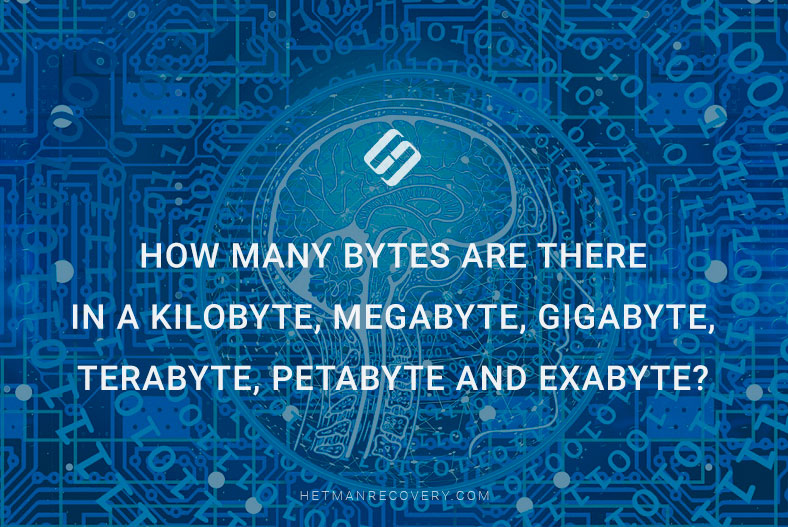Why Your External Drive May Get Slow: 6 Reasons
Discover the six common reasons why your external drive may get slow in this troubleshooting guide! From understanding disk fragmentation and insufficient power supply to outdated firmware and cable issues, we’ll explore the potential culprits behind slow external drive performance. Whether you’re using a USB hard drive, SSD, or flash drive, knowing how to identify and address these issues can help restore your drive’s speed and efficiency.
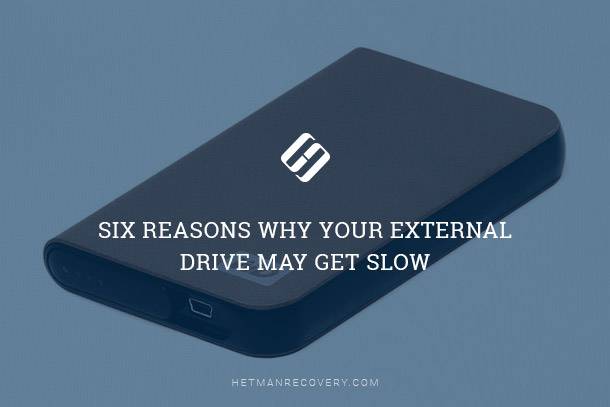
- Overview of the Problem
- Cause 1. It’s Been a Long Time Since You Run Disk Defragmentation + File System Check
- Cause 2. Logic Errors, Bad Sectors
- Cause 3. Several Applications Are Working With The Disk In an Active Mode
- Cause 4. Torrents and P2P Software
- Cause 5. Insufficient Power, USB Ports
- Cause 6. Damaged Disk
- Questions and answers
- Comments
Overview of the Problem
However, sometimes an external drive may become slow, and for no obvious reason for that – nobody dropped it, hit it or put it underwater etc. What can be done in this case? Let us try and review all of the most widespread problems and their solutions.
Important! Before writing about the things that make your HDD slow down, I would like to say a couple of words on the speed of copying and writing information from an external disk. I will start with examples.
When you copy one big file the speed will much higher than with copying a number of small ones. For example, when you copy an AVI file of 2-3 Gb to the disk the speed may be ~20 Mb/s, and when dealing with a hundred of JPG pictures it will drop to 2-3 Mb/s. That is why it is better to compress the hundreds of pictures you have into an archive first and only then send them to another disk. In this case, the speed will not be so slow.

How to Increase C Drive Space By Taking Space From D Drive 🗄️🚀💻
Cause 1. It’s Been a Long Time Since You Run Disk Defragmentation + File System Check
Windows does not always place files on a disk in one big piece in one place. As a result, before getting access to a certain file, all those pieces have to be read, i.e. spend more time on reading the entire file. If there are more and more such pieces on your disk, then its performance and overall system performance will slow down. This process is known as fragmentation (in fact, things are not exactly that way but they are better to be explained in simple language to help every user understand the principle).
To improve the situation, a reverse process should be performed – defragmentation. Before launching it, clean the hard disk of junk (unnecessary and temporary files), close all resource-intensive applications (games, torrent clients, films etc).

How to Defragment Your PC's Hard Drive on Windows 10 🛠️🗄️⏲️
How Can You Launch Defragmentation Of an External Disk?
Go to Computer (or This computer, depending on your operating system version). Click the right mouse button on the necessary disk and go to its Properties. In this tab, open Tools and click Optimize.
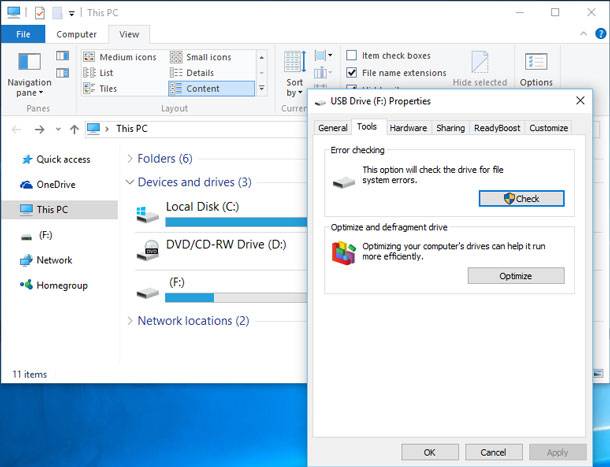
In the window that appears, Windows will inform you on the status of disk fragmentation and if it needs to be defragmented.
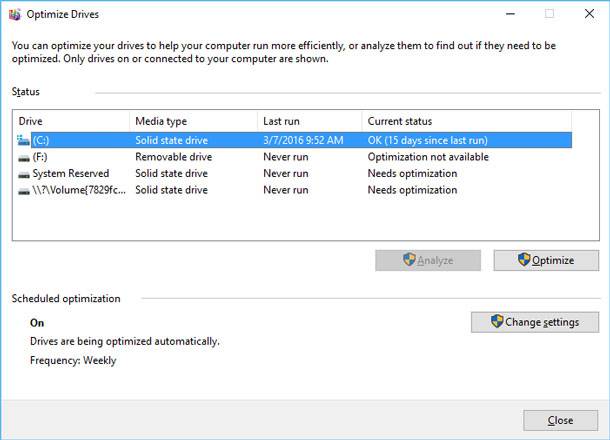
File system can have a considerable influence on fragmentation (you can see its type in disk properties). For example, FAT 32 system (once very popular) does work a little faster than NTFS but is more vulnerable to fragmentation. Moreover, it does not allow placing files larger than 4 GB on the disk.
| Characteristic | FAT32 | NTFS |
|---|---|---|
| Maximum File Size | 4 GB | 16 TB (depending on Windows version) |
| Maximum Volume Size | 8 TB (theoretical), but usually 2 TB | 256 TB (depending on Windows version) |
| Journaling Support | No | Yes |
| Performance | Good for small to medium files | Optimized for large files and high security |
| Access Control | No | Yes, supports user and group permissions |
| Compatibility with Operating Systems | Widely supported by Windows, Linux, macOS, storage devices (e.g., USB flash drives, memory cards) | Limited to Windows (macOS and Linux require additional support) |
| Usage | Used for flash drives, external disks, memory cards | Used for system drives, hard disks, large files |
| Support for Large Volumes | Limited (up to 2 TB) | Supports very large volumes (up to 256 TB) |
| Metadata Management Efficiency | Simple data management | Complex, supports metadata, enhances performance |
| File Compression Support | No | Yes |
Cause 2. Logic Errors, Bad Sectors
In general, you may not realize there are some errors on your disk because they can be accumulated for a long time without showing their presence in any way. Such errors most often emerge because of incorrect addressing of software, a conflict of drivers, sudden blackout (due to a power cut), or hang-up while the computer addresses the hard disk actively.

How to Check Your Hard Disk for Errors and Fix Them in Windows 10 🔎🛠️🗄️
By the way, Windows often launches a utility to scan the disk for errors after rebooting (many of you could notice that when trying to switch on the computer after a blackout).
As to the external disk you’d better check it for errors with the help of Windows. To do so, go to Computer, then click the right mouse button on the disk and go to its Properties. The next step is to click Tools tab and select the function Check to examine the disk for file system errors.
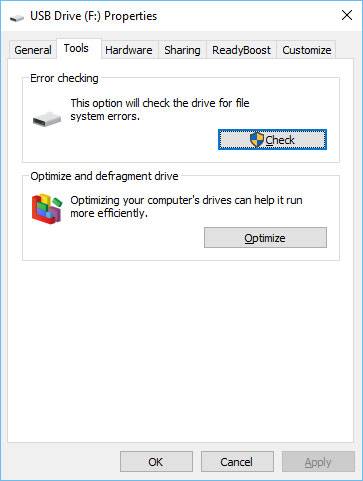
If the computer hangs up when you open Properties tab of the external disk, you can launch disk check from the command prompt. To do it, press the combination WIN + R, type in CMD and press Enter.
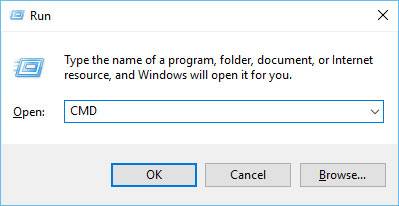
To check the disk, you should type in a command of the type: CHKDSK F: /F/R, where F: – the disk letter; /F/K – unconditional check with correction of all errors.
CHKDSK F: /F/R

A couple of things about bad sectors
Bad sectors are the hard disk sectors that cannot be read. When there are too many of them in your hard disk the file system cannot isolate them without affecting the disk performance (and its operation in general).
Cause 3. Several Applications Are Working With The Disk In an Active Mode

What to Do If Your Computer Gets Too Slow with 100% Disk Usage in Windows 10, 8, 7 💻🐢🛠️
A very frequent reason for the disk to go slow – even if it is not external – is the heavy load.
For example, at the same time you may be downloading several torrent files to your disk, watching a film from the same disk and checking the same disk for viruses. Can you imagine the amount of hard work you have given to the disk? Quite naturally, it may start slowing down, especially if it is an external HDD (and to make things worse, it’s got no additional power supply).
The easiest way to see how loaded the disk is at the moment is to enter the Task manager (by pressing CNTRL + ALT + DEL or CNTRL + SHIFT + ESC).
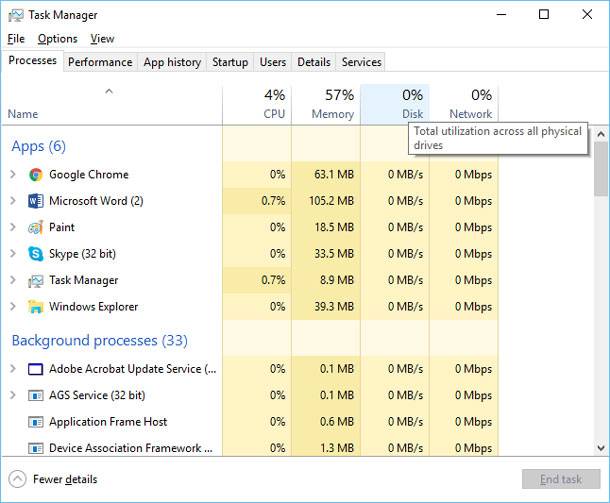
There may be some “hidden” processes to load the disk which you will never see without the task manager. We recommend closing all running programs and watch the disk behavior: if your PC stops hanging up and slowing down you can see what program was spoiling the fun.
Most often these are torrent clients, P2P software (see more below), video editors, antiviral software and other applications meant to protect your PC from viral threats.
Cause 4. Torrents and P2P Software
Torrents are all the rage now and many people buy an external disk to download information right there. There is no problem in that, but often the external disk slows down during this process – the download speed drops and a disk overload message is displayed.
In order to avoid this error and accelerate the disk performance you should adjust your torrent client accordingly (or any other P2P application you use): reduce the number of simultaneously downloaded torrent files to 1 or 2. In the first place, their download speed will be higher then, and in the second place, the disk load will be less intensive; make sure that files from one torrent are downloaded one after another (especially, if there are many of them).
Cause 5. Insufficient Power, USB Ports
Some external drives nay need more power than your USB port supplies. The matter is that different disks have their own starting and operating currents: i.e. the disk will be recognized when connected to the computer and you will see the files but the work with them will be very slow.
By the way, if you connect your disk to the front panel USB port, try connecting it to USB ports in the back panel instead. Operating currents may also be insufficient when connecting your external HDD to netbooks and tablet PCs.
There are two variants how to check if that is the reason and eliminate the slow-down problem related to insufficient power supply:
- Buy a special USB connector, one end of which should be connected to two USB ports of your PC (laptop), and the other end should be connected to the USB port of your external drive;
- You can find on sale USB hubs with supplementary power. This variant is even better because you will be able to use it to connect several disks or any other devices at once.
Cause 6. Damaged Disk
It is quite possible that your disk is nearing its end of life, especially when you observe the following, in addition to slower operation:
- your disk emits a rattling sound when connected to the PC and you try reading some data from the disk;
- your computer hangs up when addressing the disk;
- you cannot check the disk for errors because the software just freezes;
- the LED on the disk does not flash, or Windows does not recognize the disk at all (by the way, in this case your data cable may have been damaged).
An external HDD may be damaged with a slight hit (even if you think it was a slightest one). Try to remember if you happened to drop anything on the disk.
There was a case when a small book fell onto the disk from the shelf. Absolutely all right by its appearance, with no cracks or scratches, the disk made the computer freeze, emitted a rattling sound and so on. The computer came back to normal state only after the disk was disconnected from the USB port.

How to Repair Bad Sectors on Hard Drive in 2020 with HDD Regenerator ⚕️💻👨💻
In conclusion to this article, we would like to note that any of the said six causes that make your external disk go slow can also result in loss of your data. That is why if your disk contains important data and you started noticing its incorrect work, we recommend that you create a backup copy of such data. It is important because there are high chances you may have to use data recovery software or address specialized service centers.



